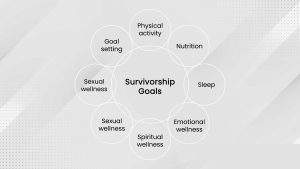What is cancer survivorship?
Broadly defined, cancer survivorship encompasses the entire cancer continuum, from the initial diagnosis through the remainder of a cancer patient`s life. It is focused on the distinct phase of cancer care following active cancer-directed treatment and comprehensively extends over a range of issues faced by survivors, including physical, mental, and social aspects of cancer experience.
The number of cancer survivors is growing due to aging populations, improved early detection, and advances in treatment. As the numbers are increasing, we need to have a well-designed survivorship care plan to adequately address the physical, psychosocial, and supportive care needs of survivors of cancer.
Why is a survivorship care plan important?
Reviewing the patient’s history of cancer and treatments highlights potential long term or late effects to consider, and recommended surveillance for recurrence.
- Follow-up schedule for monitoring of disease recurrence or second cancers
- To identify physical consequences of specific treatments like cardiac dysfunction, long-term metabolic syndrome, lymphoedema, peripheral neuropathy, infertility, osteoporosis, etc.
- Should be screened for pain and requires assessment of its potential causes along with non-pharmacological and pharmacological approaches to management.
- To address common psychosocial issues, for which there are effective psychological therapies, including fear of recurrence, fatigue, altered sleep and cognition, opioid dependence, effects on sex and intimacy, finances, and employment.
- Review of lifestyle factors including dietary patterns, smoking, alcohol, and obesity
What are the components of cancer survivorship?
Components of Cancer Survivorship
| Prevention |
|
| Surveillance |
|
| Intervention |
|
| Coordination |
|
What are the goals of Cancer Survivorship program?
What should you do as a cancer survivor?
Transition to cancer survivorship serves as a strong motivation to make lifestyle changes.
- Ask your doctor about cancer survivorship care plan
- Stop tobacco and tobacco-related products
- Reduce alcohol intake
- Physical activity: The American College of Sports Medicine recommends that survivors exercise regularly. Start slow and build up. Aim to do at least 150 minutes every week of moderate aerobic exercise, like walking and resistance (strength) training two or three days per week.
- Diet: Focus on building a diet plan high in vegetables, fruits, and whole grains. Eat in moderation to maintain a healthy body weight. Can take help of registered dietician for personalized, healthy and tasty diet plan.
- Managing stress and mental health: Experiencing high levels of stress for a long time has been linked to health problems and a lower quality of life. Ways to manage stress include exercise, social activities, support groups, mindfulness, acupuncture, yoga, massage, and other relaxation techniques. Take help of your psychiatrist or psychologist to cope up with fear, anger, anxiety or depression.
- Sexual health and intimacy: Some survivors may experience changes in their sexual function caused by cancer and cancer treatment. Even though it may feel awkward or uncomfortable, it is important to discuss what you are experiencing with your doctor and ask for a referral to a psychologist, sex therapist, urologist or gynaecologist, or other professional who deals with sexual health.
- Take help of your friends and family members for emotional support.
- Get to know about various cancer survivor support groups and NGO’s for financial and emotional support.
- Cancer rehabilitation services : Survivors and family members are encouraged to be active, informed partners in the rehabilitation process and to talk with your doctor, nurse or social worker about the rehabilitative services they are interested in.

Dr. Y Rajani Priya,
Medical Oncologist
Mahatma Gandhi Cancer Hospital and Research Institute, Visakhapatnam










